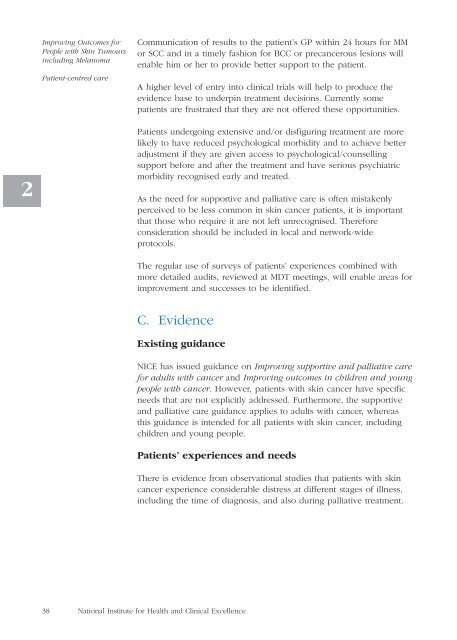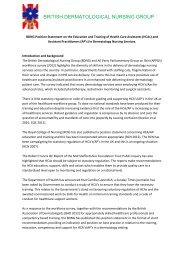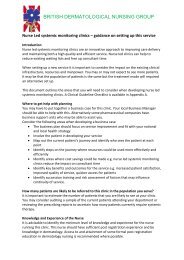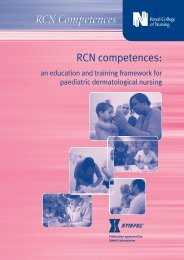Improving outcomes for people with skin tumours including melanoma
Improving outcomes for people with skin tumours including melanoma
Improving outcomes for people with skin tumours including melanoma
Create successful ePaper yourself
Turn your PDF publications into a flip-book with our unique Google optimized e-Paper software.
<strong>Improving</strong> Outcomes <strong>for</strong><br />
People <strong>with</strong> Skin Tumours<br />
<strong>including</strong> Melanoma<br />
Patient-centred care<br />
Communication of results to the patient’s GP <strong>with</strong>in 24 hours <strong>for</strong> MM<br />
or SCC and in a timely fashion <strong>for</strong> BCC or precancerous lesions will<br />
enable him or her to provide better support to the patient.<br />
A higher level of entry into clinical trials will help to produce the<br />
evidence base to underpin treatment decisions. Currently some<br />
patients are frustrated that they are not offered these opportunities.<br />
2<br />
Patients undergoing extensive and/or disfiguring treatment are more<br />
likely to have reduced psychological morbidity and to achieve better<br />
adjustment if they are given access to psychological/counselling<br />
support be<strong>for</strong>e and after the treatment and have serious psychiatric<br />
morbidity recognised early and treated.<br />
As the need <strong>for</strong> supportive and palliative care is often mistakenly<br />
perceived to be less common in <strong>skin</strong> cancer patients, it is important<br />
that those who require it are not left unrecognised. There<strong>for</strong>e<br />
consideration should be included in local and network-wide<br />
protocols.<br />
The regular use of surveys of patients’ experiences combined <strong>with</strong><br />
more detailed audits, reviewed at MDT meetings, will enable areas <strong>for</strong><br />
improvement and successes to be identified.<br />
C. Evidence<br />
Existing guidance<br />
NICE has issued guidance on <strong>Improving</strong> supportive and palliative care<br />
<strong>for</strong> adults <strong>with</strong> cancer and <strong>Improving</strong> <strong>outcomes</strong> in children and young<br />
<strong>people</strong> <strong>with</strong> cancer. However, patients <strong>with</strong> <strong>skin</strong> cancer have specific<br />
needs that are not explicitly addressed. Furthermore, the supportive<br />
and palliative care guidance applies to adults <strong>with</strong> cancer, whereas<br />
this guidance is intended <strong>for</strong> all patients <strong>with</strong> <strong>skin</strong> cancer, <strong>including</strong><br />
children and young <strong>people</strong>.<br />
Patients’ experiences and needs<br />
There is evidence from observational studies that patients <strong>with</strong> <strong>skin</strong><br />
cancer experience considerable distress at different stages of illness,<br />
<strong>including</strong> the time of diagnosis, and also during palliative treatment.<br />
38<br />
National Institute <strong>for</strong> Health and Clinical Excellence















